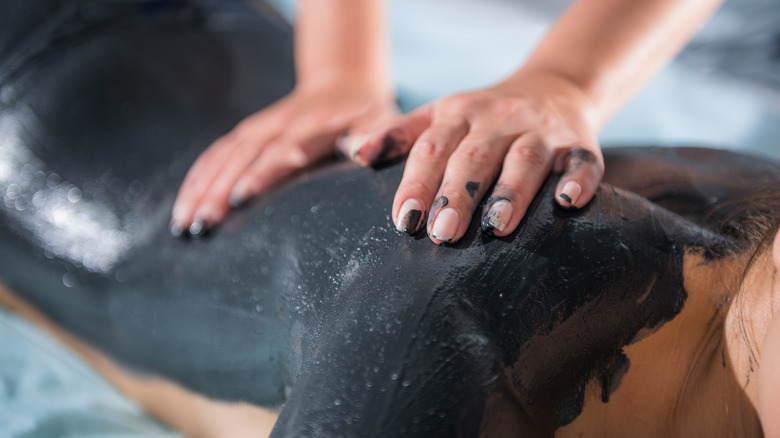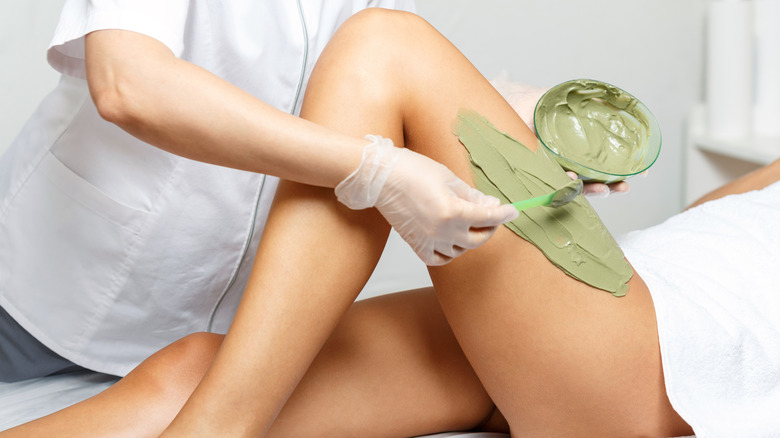What Are Body Wraps And Do They Really Help You Lose Weight?
A magic solution for losing weight would be great, wouldn't it? Body wraps are purported to be one of the latest wellness trends for dropping a few pounds, alongside many other benefits, says Healthline. Performed by an esthetician, massage therapist, or spa employee, body wraps come in many forms that provide various benefits. During a body wrap treatment, layers of material will be placed on and around parts of your body to help detoxify it. Proponents of body wrap treatments claim weight loss can occur in as little as 30 to 90 minutes. Other potential perks include tighter skin and the reduced appearance of cellulite.
A few body wrap options include decadent choices like chocolate, eucalyptus, honey, rosemary, and butter (per WebMD). According to CostHelper Health, the average cost of a body wrap treatment ranges from $80 to $200 for 45-60 minutes. However, if you wanted to attempt a DIY body wrap, there are even at-home kits you can purchase. But do these body wraps actually live up to their hype?
Benefits of body wraps
There are many benefits to using body wraps, but some claims seem to fall short (per Healthline). When it comes to losing weight, body wraps won't automatically produce a lower number when you step on the scale. However, some people may get this impression if their skin appears tighter, which some suggest they experience. If you hear they can help get rid of cellulite, be wary because there's no scientific evidence to support this.
One often raved about benefit of body wraps is the detoxifying effects that wraps made from mud, seaweed, or similar ingredients may have, says WebMD. While detoxification is a broad term and isn't necessarily scientifically backed up, there are ways that your body can absorb nutrients and sweat out harmful substances. Body wraps can cause you to sweat, thus releasing bacteria and tiny amounts of toxins (via WebMD). It's important to note that when you sweat, your body also loses electrolytes, so prioritize replenishing the electrolytes you sweat out by drinking plenty of water and fluids after a body wrap treatment. While one body wrap may make you sweat, other wraps can add nutrients to the skin (per MedicineNet). Body wraps made of seaweed and algae have vitamins that can be absorbed into the skin and provide nourishment, especially when applied warm. Similarly, body wraps made of coconut oil, shea butter, or aloe vera can moisturize skin.
Safety tips when using body wraps
Before trying a body wrap treatment, whether at home or in a spa, there are some safety tips you should know. According to Healthline, there is a risk of dehydration that can occur during body wrap treatments because your internal core temperature is increased during the treatment. Especially if you are using a neoprene wrap or another form of body wrap that is tight around your body. Therefore, drinking plenty of water both, before and after treatment is highly recommended. Keep in mind, being tightly bound can also result in side effects from compression, which can create discomfort.
Another important safety tip is knowing how the ingredients in the body wrap solution may affect you, including whether or not you may have allergies to the solution (per Healthline). If you have sensitive skin or are prone to eczema, be mindful of body wrap ingredients that could exacerbate irritation or cause flare-ups. That said, the National Eczema Association recommends wet wrap therapy, where you place wet cotton gloves or gauze on eczema, to relieve symptoms of the skin condition. Wet wrap therapy is a form of body wrap that can be performed at home. If you have any concerns about body wrap solutions, always consult with your doctor or treatment provider.



